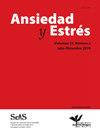I. De-Torres Garcia, F. Bustos, J. Arango-Lasprilla, P. Fernández-Berrocal
求助PDF
{"title":"获得性脑损伤和认知障碍患者照护者的情绪智力能力:是否与超负荷或恢复力有关?","authors":"I. De-Torres Garcia, F. Bustos, J. Arango-Lasprilla, P. Fernández-Berrocal","doi":"10.5093/anyes2022a6","DOIUrl":null,"url":null,"abstract":"Introduction: Acquired brain injury entails stressful situations of emotional complexity. Objective: To evaluate possible relationship among emotional intelligence, emotional status, resilience, and burden sensation of caregivers of patients with cognitive-behavioral impairment due to acquired brain injury in isolation circumstances because of COVID-19 pandemic. Material and methods: An observational descriptive cross-sectional study of prevalence was designed with a sample of 17 caregivers of patients with cognitive-behavioral impairment due to acquired brain injury. Main outcome measures: Caregiver Burden Interview, the 10-item Connor-Davidson Resilience Scale, Emotional Health, the Trait Meta-Mood Scale and the Positive and Negative Affect Schedule. Results: The median age of the 17 caregivers was 47.5 years, 71% of women had a median care-time of 3.5 years, and 65% of the total sample were spouses of the patients. 70% of the patients were affected by stroke (hemorrhagic or ischemic cause). 59% of the caregivers presented a low level of emotional attention and emotional clarity, and 47 %, low emotional repair ability. 82% of them did not report overload, 53% showed low resilience level. Emotional intelligence showed strong correlation with resilience and mental health of caregivers. All of them were positively correlated with daily positive emotions and negatively correlated with negative emotions and overload. Conclusions: Emotional intelligence, resilience, and mental health of caregivers are strongly correlated. All of them increase positive emotions and reduce negative emotions and overload. © 2022","PeriodicalId":45616,"journal":{"name":"Ansiedad y Estres-Anxiety and Stress","volume":"28 1","pages":""},"PeriodicalIF":0.5000,"publicationDate":"2021-01-01","publicationTypes":"Journal Article","fieldsOfStudy":null,"isOpenAccess":false,"openAccessPdf":"","citationCount":"3","resultStr":"{\"title\":\"Emotional intelligence abilities of caregivers of patients with acquired brain injury and cognitive impairment: Are they related to overload or resilience?\",\"authors\":\"I. De-Torres Garcia, F. Bustos, J. Arango-Lasprilla, P. Fernández-Berrocal\",\"doi\":\"10.5093/anyes2022a6\",\"DOIUrl\":null,\"url\":null,\"abstract\":\"Introduction: Acquired brain injury entails stressful situations of emotional complexity. Objective: To evaluate possible relationship among emotional intelligence, emotional status, resilience, and burden sensation of caregivers of patients with cognitive-behavioral impairment due to acquired brain injury in isolation circumstances because of COVID-19 pandemic. Material and methods: An observational descriptive cross-sectional study of prevalence was designed with a sample of 17 caregivers of patients with cognitive-behavioral impairment due to acquired brain injury. Main outcome measures: Caregiver Burden Interview, the 10-item Connor-Davidson Resilience Scale, Emotional Health, the Trait Meta-Mood Scale and the Positive and Negative Affect Schedule. Results: The median age of the 17 caregivers was 47.5 years, 71% of women had a median care-time of 3.5 years, and 65% of the total sample were spouses of the patients. 70% of the patients were affected by stroke (hemorrhagic or ischemic cause). 59% of the caregivers presented a low level of emotional attention and emotional clarity, and 47 %, low emotional repair ability. 82% of them did not report overload, 53% showed low resilience level. Emotional intelligence showed strong correlation with resilience and mental health of caregivers. All of them were positively correlated with daily positive emotions and negatively correlated with negative emotions and overload. Conclusions: Emotional intelligence, resilience, and mental health of caregivers are strongly correlated. All of them increase positive emotions and reduce negative emotions and overload. © 2022\",\"PeriodicalId\":45616,\"journal\":{\"name\":\"Ansiedad y Estres-Anxiety and Stress\",\"volume\":\"28 1\",\"pages\":\"\"},\"PeriodicalIF\":0.5000,\"publicationDate\":\"2021-01-01\",\"publicationTypes\":\"Journal Article\",\"fieldsOfStudy\":null,\"isOpenAccess\":false,\"openAccessPdf\":\"\",\"citationCount\":\"3\",\"resultStr\":null,\"platform\":\"Semanticscholar\",\"paperid\":null,\"PeriodicalName\":\"Ansiedad y Estres-Anxiety and Stress\",\"FirstCategoryId\":\"1085\",\"ListUrlMain\":\"https://doi.org/10.5093/anyes2022a6\",\"RegionNum\":0,\"RegionCategory\":null,\"ArticlePicture\":[],\"TitleCN\":null,\"AbstractTextCN\":null,\"PMCID\":null,\"EPubDate\":\"\",\"PubModel\":\"\",\"JCR\":\"Q4\",\"JCRName\":\"PSYCHOLOGY, CLINICAL\",\"Score\":null,\"Total\":0}","platform":"Semanticscholar","paperid":null,"PeriodicalName":"Ansiedad y Estres-Anxiety and Stress","FirstCategoryId":"1085","ListUrlMain":"https://doi.org/10.5093/anyes2022a6","RegionNum":0,"RegionCategory":null,"ArticlePicture":[],"TitleCN":null,"AbstractTextCN":null,"PMCID":null,"EPubDate":"","PubModel":"","JCR":"Q4","JCRName":"PSYCHOLOGY, CLINICAL","Score":null,"Total":0}
引用次数: 3
引用
批量引用
Emotional intelligence abilities of caregivers of patients with acquired brain injury and cognitive impairment: Are they related to overload or resilience?
Introduction: Acquired brain injury entails stressful situations of emotional complexity. Objective: To evaluate possible relationship among emotional intelligence, emotional status, resilience, and burden sensation of caregivers of patients with cognitive-behavioral impairment due to acquired brain injury in isolation circumstances because of COVID-19 pandemic. Material and methods: An observational descriptive cross-sectional study of prevalence was designed with a sample of 17 caregivers of patients with cognitive-behavioral impairment due to acquired brain injury. Main outcome measures: Caregiver Burden Interview, the 10-item Connor-Davidson Resilience Scale, Emotional Health, the Trait Meta-Mood Scale and the Positive and Negative Affect Schedule. Results: The median age of the 17 caregivers was 47.5 years, 71% of women had a median care-time of 3.5 years, and 65% of the total sample were spouses of the patients. 70% of the patients were affected by stroke (hemorrhagic or ischemic cause). 59% of the caregivers presented a low level of emotional attention and emotional clarity, and 47 %, low emotional repair ability. 82% of them did not report overload, 53% showed low resilience level. Emotional intelligence showed strong correlation with resilience and mental health of caregivers. All of them were positively correlated with daily positive emotions and negatively correlated with negative emotions and overload. Conclusions: Emotional intelligence, resilience, and mental health of caregivers are strongly correlated. All of them increase positive emotions and reduce negative emotions and overload. © 2022

 求助内容:
求助内容: 应助结果提醒方式:
应助结果提醒方式:


